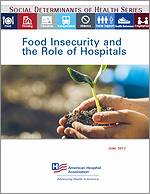Social Determinants of Health Series: Food Insecurity and the Role of Hospitals
As part of our work to Advance Health in America, the AHA is launching a series of guides on how hospitals can address the determinants of health such as food, housing and education, to improve the environment where people live, work and play. “Food Insecurity and the Role of Hospitals” is the first guide in this series.

What is food insecurity?
According to the U.S. Department of Agriculture, food insecurity is defined as a household-level economic and social condition of limited or uncertain access to adequate food with either disrupted eating patterns or reduced food intake. Food insecurity, a determinant of health, affected more than 12.7 percent of U.S. households—that is, 15.8 million households—in 2015.
How are food insecurity and health related?
Adults who are food insecure are at an increased risk of developing chronic diseases, and children who are food insecure are at risk for developmental issues. This can lead to an increase in hospital readmissions and medical treatments. This guide describes the link between food insecurity and adverse health issues and outlines clinical and nonclinical approaches that hospitals and health systems can use to reduce food insecurity and the stigma often associated with it.
What is the role of hospitals in addressing food insecurity?
Case studies in this guide highlight the innovative strategies and programs of several hospitals and health care systems to reduce food insecurity in their communities.
- Arkansas Children Hospital, in partnership with the U.S. Department of Agriculture, offers free healthy lunches to children on campus and in clinics.
- Boston Medical Center has an on-site food pantry that distributes more than 15,000 pounds of healthy food to referred patients every week.
- Eskenazi Health is partnering with Meals on Wheels of Central Indiana to provide recently discharged patients with 30 days of medically tailored meals for free.
- ProMedica has integrated the Children's HealthWatch Hunger Vital SignTM survey in its database to identify patients who are food insecure. The survey identified more than 2,000 such patients in 2016.
Download “Community Health Initiatives at the American Hospital Association”
Listen to a podcast with Geisinger Health on their Fresh Food Pharmacy here.
Watch the story behind Boston Medical Center's Preventive Food Pantry here, narrated by Latchman Hiralall, pantry director.
View additional resources on food insecurity from H&HN.
View an archive of the Food Insecurity and the Role of Hospitals webinar here.
Social Determinants Of Health Series:
 |  |  |  |
 |  |  |  |
